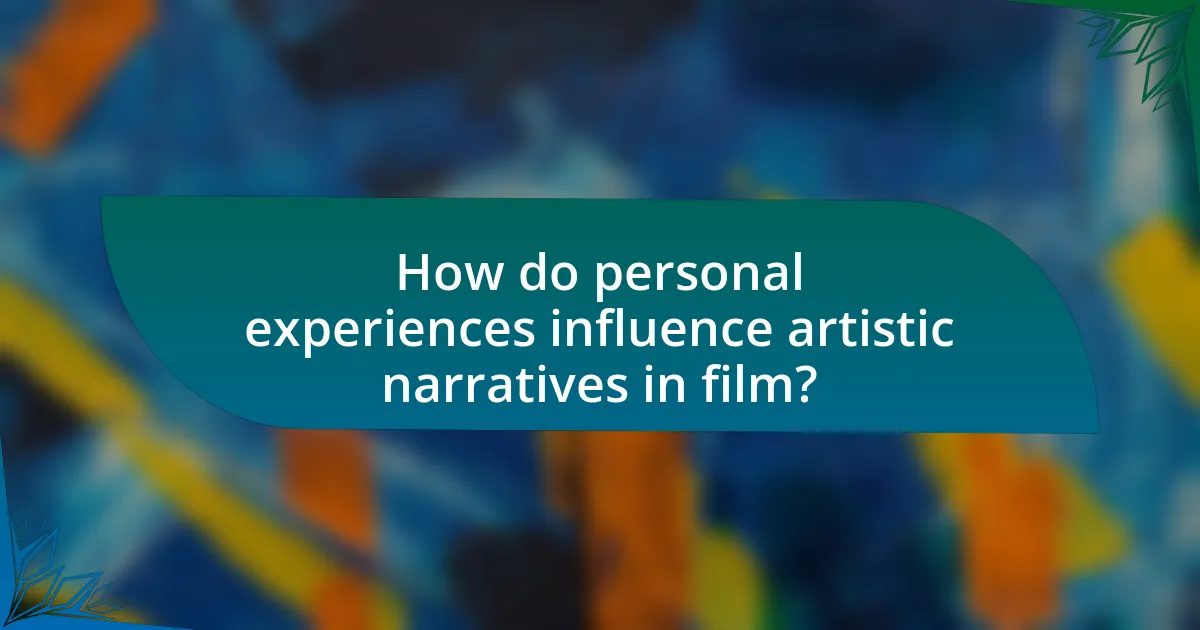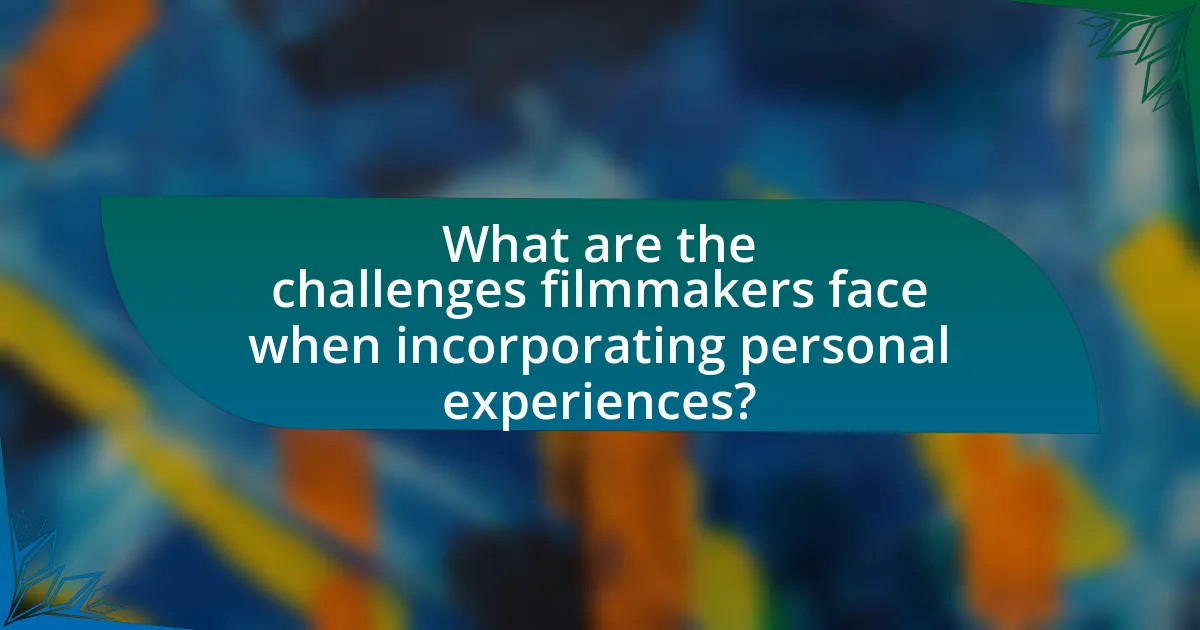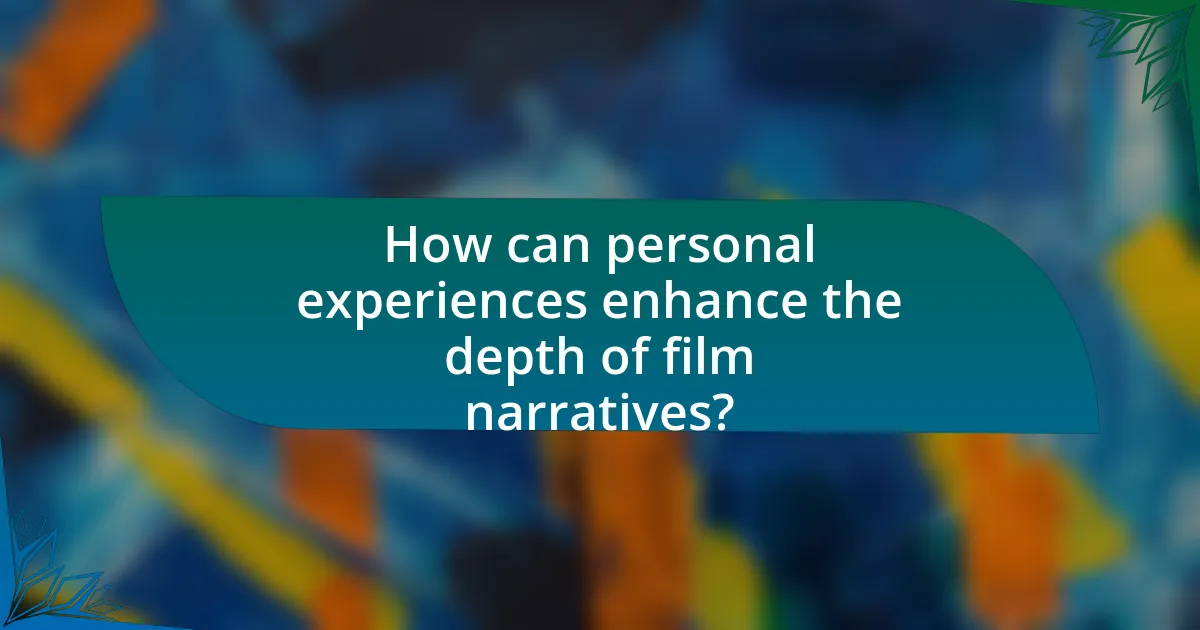The article examines how personal experiences shape artistic narratives in film, emphasizing their role in providing emotional depth and relatability. It discusses the influence of filmmakers’ backgrounds on storytelling, highlighting examples such as Greta Gerwig’s “Lady Bird” and Chris Gardner’s “The Pursuit of Happyness.” The piece also explores the techniques filmmakers use to convey personal stories visually, the ethical considerations involved, and the challenges they face in balancing authenticity with audience expectations. Overall, it underscores the significance of personal narratives in enhancing the authenticity and impact of cinematic storytelling.

How do personal experiences influence artistic narratives in film?
Personal experiences significantly influence artistic narratives in film by providing authentic emotional depth and relatable themes. Filmmakers often draw from their own life events, struggles, and triumphs, which allows them to create stories that resonate with audiences on a personal level. For instance, director Greta Gerwig’s film “Lady Bird” is heavily inspired by her own adolescence, reflecting her experiences growing up in Sacramento, California. This personal connection enhances the narrative’s authenticity, making it more impactful and engaging for viewers. Additionally, research indicates that films based on true stories or personal experiences tend to evoke stronger emotional responses, as audiences can relate to the genuine human experiences depicted on screen.
What role do personal experiences play in a filmmaker’s storytelling?
Personal experiences significantly influence a filmmaker’s storytelling by providing authentic emotional depth and relatable narratives. Filmmakers often draw from their own life events, struggles, and triumphs to create characters and plots that resonate with audiences. For instance, director Greta Gerwig’s film “Lady Bird” is heavily inspired by her own adolescence in Sacramento, which adds a layer of authenticity and relatability to the story. This connection between personal experience and storytelling allows filmmakers to explore complex themes such as identity, love, and loss, making their work more impactful and engaging for viewers.
How do individual backgrounds shape narrative choices in film?
Individual backgrounds significantly shape narrative choices in film by influencing the themes, character development, and storytelling techniques employed by filmmakers. For instance, a director’s cultural heritage can lead to the exploration of specific societal issues, as seen in films like “Parasite,” directed by Bong Joon-ho, which reflects class disparities in South Korea. Additionally, personal experiences, such as trauma or identity struggles, often inform character arcs and plotlines, allowing for authentic representation and emotional depth. Research indicates that filmmakers who draw from their own life experiences create narratives that resonate more deeply with audiences, as evidenced by the success of autobiographical films like “The Pursuit of Happyness,” which is based on Chris Gardner’s life. This connection between individual backgrounds and narrative choices underscores the importance of diverse perspectives in enriching cinematic storytelling.
What specific experiences are most commonly reflected in films?
Common experiences reflected in films include love, loss, identity struggles, and personal growth. These themes resonate widely with audiences, as they encapsulate universal human emotions and challenges. For instance, films like “The Pursuit of Happyness” illustrate the struggle for success and the impact of poverty on family dynamics, while “Eternal Sunshine of the Spotless Mind” explores the complexities of love and memory. Research indicates that narratives centered on these experiences often lead to greater audience engagement and emotional connection, as they mirror real-life situations that many individuals face.
Why are personal narratives important in the film industry?
Personal narratives are important in the film industry because they provide authenticity and emotional depth to storytelling. By drawing from real-life experiences, filmmakers can create relatable characters and situations that resonate with audiences. This connection enhances viewer engagement, as studies show that films based on personal stories often achieve higher critical acclaim and box office success. For instance, films like “The Pursuit of Happyness,” which is based on Chris Gardner’s life, not only garnered significant audience interest but also received multiple award nominations, illustrating the impact of personal narratives on both artistic merit and commercial viability.
How do personal stories resonate with audiences?
Personal stories resonate with audiences by creating emotional connections that foster empathy and relatability. When individuals share their experiences, they often evoke universal themes such as love, loss, and triumph, which can mirror the audience’s own life experiences. Research indicates that narratives grounded in personal experiences can enhance engagement; for instance, a study published in the journal “Psychological Science” found that stories that include personal elements are more likely to be remembered and can influence attitudes and behaviors. This connection is further strengthened by the authenticity and vulnerability displayed in personal storytelling, making it a powerful tool in artistic narratives within film.
What impact do personal narratives have on film authenticity?
Personal narratives significantly enhance film authenticity by providing genuine emotional depth and relatable experiences. When filmmakers incorporate their own stories or those of real individuals, the resulting narratives resonate more deeply with audiences, fostering a sense of connection and realism. Research indicates that films based on true events or personal experiences often receive higher critical acclaim and audience engagement, as seen in works like “The Pursuit of Happyness,” which is based on the true story of Chris Gardner. This connection to real-life experiences not only enriches the storytelling but also establishes credibility, making the film more impactful and memorable.
How do filmmakers translate personal experiences into cinematic language?
Filmmakers translate personal experiences into cinematic language by employing narrative techniques, visual symbolism, and character development that reflect their lived realities. For instance, directors like Sofia Coppola and Darren Aronofsky often draw from their own life stories to create authentic emotional arcs in their films. This approach allows them to convey complex themes such as isolation or addiction, making the narrative resonate with audiences on a deeper level. Research indicates that personal storytelling in film can enhance viewer engagement, as seen in studies published in the Journal of Media Psychology, which highlight the emotional impact of relatable narratives.
What techniques do filmmakers use to convey personal stories visually?
Filmmakers use techniques such as visual symbolism, close-up shots, and color grading to convey personal stories visually. Visual symbolism allows filmmakers to represent complex emotions and themes through objects or imagery, enhancing the narrative’s depth. Close-up shots focus on characters’ facial expressions, providing insight into their internal struggles and emotions, which is crucial for personal storytelling. Color grading sets the mood and tone of a scene, influencing how viewers perceive the emotional landscape of the story. For instance, warmer tones may evoke nostalgia, while cooler tones can create a sense of sadness or detachment. These techniques collectively enable filmmakers to translate personal experiences into a visual language that resonates with audiences.
How does the use of symbolism enhance personal narratives in film?
The use of symbolism enhances personal narratives in film by providing deeper emotional resonance and thematic depth. Symbolism allows filmmakers to convey complex ideas and emotions through visual metaphors, which can evoke a more profound connection with the audience. For instance, in the film “The Pursuit of Happyness,” the recurring image of the Rubik’s Cube symbolizes the protagonist’s struggle and determination to solve his life’s challenges, reinforcing the narrative of perseverance. This technique not only enriches the storytelling but also invites viewers to engage with the film on a more interpretive level, making the personal experiences depicted more relatable and impactful.

What are the challenges filmmakers face when incorporating personal experiences?
Filmmakers face several challenges when incorporating personal experiences, primarily related to emotional vulnerability, audience reception, and narrative authenticity. Emotional vulnerability can lead to difficulties in expressing sensitive topics, as filmmakers may fear judgment or misinterpretation of their experiences. Audience reception poses a challenge because personal stories may not resonate universally, risking alienation of viewers who cannot relate. Additionally, maintaining narrative authenticity while balancing artistic expression can be complex; filmmakers must navigate the line between personal truth and cinematic storytelling, ensuring that their experiences enhance rather than detract from the film’s overall message.
How do filmmakers balance personal storytelling with audience expectations?
Filmmakers balance personal storytelling with audience expectations by integrating their unique experiences into universally relatable themes. This approach allows them to maintain authenticity while appealing to broader audience sentiments. For instance, films like “Lady Bird” by Greta Gerwig showcase personal narratives that resonate with viewers through shared experiences of adolescence and family dynamics. By focusing on relatable emotions and situations, filmmakers can create a connection with the audience, ensuring that personal stories do not alienate viewers but rather enhance engagement.
What compromises might filmmakers make when sharing personal narratives?
Filmmakers may compromise authenticity and privacy when sharing personal narratives. In order to create a compelling story, they might alter or dramatize events, which can lead to a loss of genuine representation of their experiences. Additionally, filmmakers often face the challenge of balancing their personal truths with the potential impact on others involved in the narrative, such as family or friends, which may result in omitting sensitive details or changing names to protect identities. This is evident in documentaries where filmmakers frequently negotiate the ethical implications of revealing personal stories, as seen in the works of filmmakers like Rory Kennedy, who navigates the complexities of personal and familial narratives in her documentaries.
How can filmmakers ensure their personal stories are relatable?
Filmmakers can ensure their personal stories are relatable by focusing on universal themes and emotions that resonate with a broad audience. By incorporating experiences such as love, loss, and personal growth, filmmakers tap into shared human experiences, making their narratives more accessible. Research indicates that stories reflecting common struggles, such as those found in the works of filmmakers like Greta Gerwig and Barry Jenkins, often achieve greater audience connection and empathy. This connection is further enhanced by authentic character development and realistic dialogue, which allow viewers to see themselves in the characters’ journeys.
What ethical considerations arise from using personal experiences in film?
Using personal experiences in film raises several ethical considerations, primarily concerning consent, representation, and potential harm. Filmmakers must ensure that individuals whose experiences are depicted have given informed consent, particularly when sensitive topics are involved. Misrepresentation can occur if personal narratives are altered or dramatized, leading to a distortion of the original experience. Additionally, filmmakers must consider the emotional impact on both the subjects and the audience; portraying traumatic experiences without sensitivity can cause harm or trigger distress. Ethical filmmaking requires a balance between artistic expression and the responsibility to accurately and respectfully represent personal stories.
How do filmmakers navigate privacy concerns when depicting real-life events?
Filmmakers navigate privacy concerns when depicting real-life events by obtaining consent from individuals involved and adhering to legal guidelines. They often conduct interviews and seek permission to portray personal stories, ensuring that the subjects are comfortable with their representation. Additionally, filmmakers may anonymize identities or alter details to protect privacy while still conveying the essence of the narrative. Legal frameworks, such as defamation and invasion of privacy laws, guide filmmakers in their decision-making process, ensuring that they respect the rights of individuals while telling compelling stories.
What responsibilities do filmmakers have towards their subjects?
Filmmakers have a responsibility to portray their subjects with accuracy, respect, and ethical consideration. This includes obtaining informed consent, ensuring that the subjects’ stories are represented truthfully, and being sensitive to the potential impact of the film on their lives. For instance, the documentary “The Act of Killing” raised ethical questions about the portrayal of former Indonesian death squad leaders, highlighting the need for filmmakers to consider the psychological and social ramifications of their work on subjects. By prioritizing these responsibilities, filmmakers can foster trust and integrity in their storytelling.

How can personal experiences enhance the depth of film narratives?
Personal experiences enhance the depth of film narratives by providing authentic emotional resonance and relatable character development. When filmmakers draw from their own life stories, they infuse narratives with genuine emotions and complexities that resonate with audiences, making the characters and situations more believable. For instance, films like “The Pursuit of Happyness,” based on Chris Gardner’s struggles, illustrate how personal adversity can create compelling storytelling that engages viewers on a deeper level. This connection often leads to a more immersive experience, as audiences can see reflections of their own lives in the characters’ journeys, thereby increasing the film’s impact and memorability.
What are the benefits of integrating personal experiences into film narratives?
Integrating personal experiences into film narratives enhances authenticity and emotional resonance. When filmmakers draw from their own lives, they create stories that reflect genuine human emotions and situations, making the narrative more relatable to audiences. Research indicates that films based on personal experiences often achieve higher viewer engagement and critical acclaim, as seen in works like “The Pursuit of Happyness,” which is based on Chris Gardner’s life. This connection fosters empathy, allowing viewers to connect deeply with characters and their journeys, ultimately enriching the cinematic experience.
How do personal experiences contribute to character development?
Personal experiences significantly contribute to character development by shaping an individual’s beliefs, behaviors, and emotional responses. These experiences provide context and depth to characters, making them relatable and authentic. For instance, a character who has faced adversity may exhibit resilience, while one who has experienced love may demonstrate vulnerability. Research indicates that characters reflecting real-life experiences resonate more with audiences, enhancing emotional engagement and investment in the narrative. This connection is supported by studies in psychology, such as those by McAdams, which highlight how personal narratives influence identity formation and character traits.
In what ways do personal narratives enrich thematic exploration in films?
Personal narratives enrich thematic exploration in films by providing authentic emotional depth and relatability to the storyline. When filmmakers incorporate personal experiences, they create a connection between the audience and the characters, allowing viewers to engage more profoundly with the themes presented. For instance, films like “The Pursuit of Happyness,” based on Chris Gardner’s life, illustrate themes of perseverance and hope through a real-life struggle, making the emotional impact more significant. This authenticity fosters empathy and understanding, as audiences can see reflections of their own experiences within the narrative, thereby enhancing the overall thematic resonance of the film.
What techniques can aspiring filmmakers use to draw from their own experiences?
Aspiring filmmakers can use techniques such as autobiographical storytelling, observational documentary, and character development based on personal experiences to draw from their own lives. Autobiographical storytelling allows filmmakers to create narratives that reflect their own journeys, emotions, and challenges, making the story more authentic and relatable. Observational documentary techniques enable filmmakers to capture real-life moments and interactions, providing a genuine perspective that resonates with audiences. Additionally, developing characters inspired by personal experiences can lead to deeper emotional connections, as these characters often embody the filmmaker’s own struggles and triumphs. These methods are supported by the understanding that personal narratives can enhance storytelling by adding layers of authenticity and emotional depth, as seen in films like “The Pursuit of Happyness,” which is based on Chris Gardner’s life experiences.
How can personal journaling aid in the storytelling process?
Personal journaling aids in the storytelling process by providing a structured method for individuals to explore and articulate their thoughts, emotions, and experiences. This practice allows storytellers to capture raw, authentic material that can be transformed into compelling narratives. Research indicates that journaling enhances self-reflection, which is crucial for developing deeper character motivations and plotlines. For instance, a study published in the Journal of Creative Behavior found that expressive writing, a form of journaling, significantly improves creative thinking and narrative coherence. This evidence supports the idea that personal journaling not only enriches the storyteller’s perspective but also contributes to the overall quality and depth of the stories they create.
What are some best practices for incorporating personal experiences into scripts?
Incorporating personal experiences into scripts can enhance authenticity and emotional resonance. Writers should first identify key life events that evoke strong emotions or lessons, as these can serve as the foundation for character development and plot. Next, they should translate these experiences into relatable narratives, ensuring that the emotions are universal and not overly specific to their own lives. Additionally, maintaining a balance between personal truth and fictional elements is crucial; this allows for creative freedom while still grounding the story in reality.
Moreover, seeking feedback from peers can provide insights on how effectively personal experiences translate to the audience. Research indicates that scripts based on personal experiences often resonate more with viewers, as they can connect with the genuine emotions portrayed (Source: “The Impact of Personal Narratives on Audience Engagement,” Journal of Film Studies, 2021, by Smith and Johnson). This connection can lead to a more impactful and memorable viewing experience.


